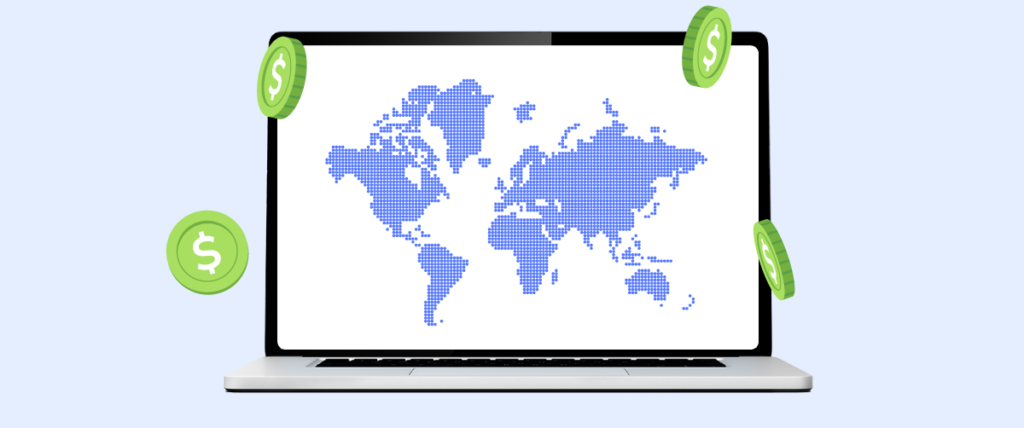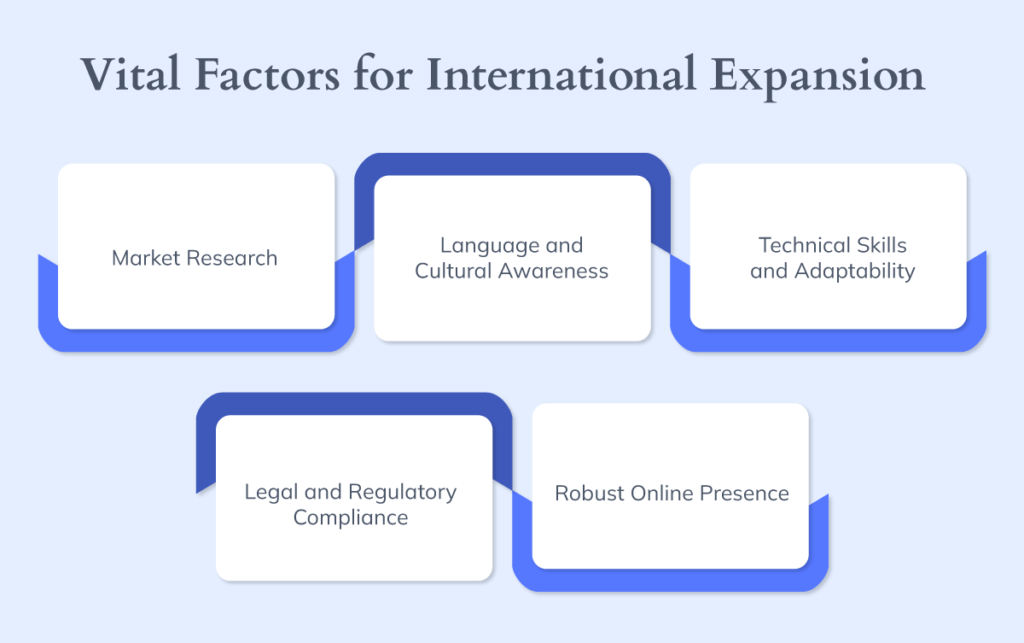The world of software development is increasingly moving beyond local confines. With technology erasing geographical boundaries, systems software developers and web developers, to mention a few, find unprecedented opportunities to broaden their presence internationally.
This trend opens new markets and introduces developers to varied challenges and enriching learning experiences.
Surging Demand for Software Development: A Look at the Global Market
The global demand for software development is experiencing a significant upswing, driven by digital transformation across industries.
According to recent research, the global software development market is expected to grow to USD 507.23 billion by 2025 at a Compound Annual Growth Rate (CAGR) of 5.3%. This growth is indicative of businesses’ increasing reliance on digital solutions worldwide.
The United States continues to hold one of the largest shares of the software development market, accounting for 42.82% in 2020. This underscores the country’s pivotal role in the software development industry and its capacity to set trends that resonate globally.
However, the demand for developers is not limited to the US. For instance, the worldwide low-code development platform market is expected to reach USD 52.31 billion by 2026, growing at a CAGR of 40.1%. This suggests a growing recognition of the value of these platforms in streamlining the software development process across the globe.
A Shift Towards Efficiency
Furthermore, software development enterprises are adopting Agile methodologies and DevOps practices. Around 60% of these entities apply Agile methodologies, while roughly 71% have embraced DevOps.
These figures underscore a definitive move towards more effective and collaborative approaches in software development. Thereby boosting the demand for skilled software engineers, software quality assurance analysts, and web developers.
JavaScript retains its position as the most popular programming language, with 77% of developers employing it. This prevalence attests to the language’s flexibility and critical role in today’s software development ecosystem.
Moreover, remote work is accelerating, with over 46% of software developers working full-time or part-time. This evolution mirrors the shifting work culture and allows developers to participate in international projects and collaborate with global teams.
Remote Work and Global Opportunities

In the context of these trends, it’s apparent that the demand for software developers, including systems software developers, web developers, and mobile developers, is escalating globally.
For developers eager to leverage this trend, comprehending the market dynamics, excelling in in-demand skills, and adopting flexible work arrangements are pivotal strategies.
The globalization of the workforce, driven by the rise of remote work, has significantly expanded opportunities for developers and businesses. This trend democratizes access to a global talent pool, allowing companies to leverage a wider range of skills and perspectives.
The Rise of Mobile and Web Development
The digital commerce landscape is witnessing a transformative rise. This transformation is powered by the ubiquity of smartphones and the relentless growth of e-commerce.
Fueled by the current growth in demand, developers are presented with favorable conditions to tap into global opportunities. This translates to an environment ripe for the international expansion of mobile and web development services.
Recent statistics underscore the magnitude of this opportunity: smartphone penetration is projected to reach 87.08% by 2025, with an estimated 307 million users in the U.S. alone, according to the Bureau of Labor Statistics.
Fueling International Expansion: Soaring Mobile Use and E-commerce Growth
Globally, mobile e-commerce sales are expected to surpass $7.08 trillion by 2027, with a staggering 88% of e-commerce sales projected to come from mobile devices. This trend is not confined to the U.S.; the Asia Pacific region is poised to dominate the web development market share, thanks to its burgeoning population and soaring internet penetration.
Developers can look to specific regions where demand for their expertise is growing. The United States continues to be a hub for technological innovation. At the same time, the Asia Pacific market is ripe for digital services, driven by a tech-savvy consumer base and increasing mobile commerce activities.
Europe, with its strong economy and commitment to data privacy, offers a stable environment for web development projects. Emerging markets such as India and China are becoming hotspots for outsourcing due to their vast pools of skilled developers and competitive pricing.
In aligning with the Bureau of Labor Statistics, software developers, including systems software engineers and web developers, are at the forefront of this shift, navigating the software development process, from computer programming and writing code to software testing and ensuring software quality assurance.
Developing custom software for a global audience with diverse needs emphasizes the importance of ongoing learning. This includes formal education and extra computer science training to equip developers with the skills required for international expansion and remote work.
Strategic Benefits of International Expansion
International expansion offers software developers, including those skilled in computer systems design and computer science, a unique set of strategic advantages.
Developers unlock new revenue streams and gain exposure to diverse projects by stepping beyond local markets. By applying cutting-edge technologies, they set themselves apart in a competitive industry.
Diversifying Revenue Streams
Accessing international markets opens up previously untapped financial avenues. Systems software developers who create solutions for global clients can benefit from varied project demands. This can lead to more robust income sources.
An example of success is a mobile app and web developer expanding its services to Asia Pacific. Due to the high demand for mobile devices and applications, the company experienced a significant uptick in revenue. This move not only boosted its financial health but also solidified its presence on the global stage.
Portfolio Diversification
Engaging in international projects enables developers to augment their portfolios with various technologies and challenges.
Application software developers can leverage this trend by creating custom software compatible with various operating systems. Alternatively, they can pursue back-end development for multinational corporations, catering to their global clientele.
Such experiences enrich a developer’s portfolio, illustrating their capacity to adapt and innovate across varied technological landscapes and client demands.
Access to Cutting-Edge Technologies
International collaborations often mean working alongside clients at the vanguard of technological innovation.
Software developers, especially those in quality assurance and development, constantly encounter new programming languages, methodologies, and processes.
This exposure strengthens their skill set by keeping them updated with global technology trends.
Competitive Advantage
A global presence inherently differentiates developers in a crowded market.
Participating in international expansion projects allows software engineers and web developers to showcase their ability to navigate intricate project needs. This experience demonstrates their ability to adapt to and handle cultural differences in the global development landscape.
The tech industry highly values this global experience, as it fosters effective communication with diverse teams and clients. This is because strong communication skills are crucial in such a multicultural environment.
Developers with experience in international projects frequently gain a stronger grasp of global software needs and consumer electronics trends.
This deeper understanding translates into a significant competitive advantage in the job market.
Key Steps for Successful International Expansion

Expanding your development business internationally is a significant step towards tapping into new markets and diversifying your client base. Here are key strategies to ensure a successful global expansion.
Market Research and Targeting
Identifying promising markets for international expansion requires thorough market research.
Developers should analyze the demand for specific programming languages and software development services. They must understand the competitive landscape and consider cultural nuances affecting business operations.
For instance, the popularity of certain operating systems or mobile devices in a target market could influence the demand for applications software developers or mobile developers.
Additionally, understanding cultural preferences can guide the customization of software programs to meet local needs.
Skill Adaptation and Technical Preparedness
Staying abreast of the preferred technologies and programming languages in target markets is crucial for software developers.
Online platforms and professional certifications can facilitate continuous learning and skill development. These ensure developers can adapt their expertise to meet international clients’ technical requirements and expectations.
Navigating Legal and Regulatory Landscapes
Understanding target markets’ legal and regulatory frameworks is essential for successful international expansion. This includes compliance with international data protection laws, critical for software developers handling sensitive information.
Familiarizing with the contractual nuances and compliance requirements in different jurisdictions can help mitigate legal risks and ensure smooth operations.
Building a Strong Online Presence
Creating a multilingual website and optimizing it for search engines is key to reaching a global audience. Additionally, developers should leverage social media to showcase their projects, skills, and success stories.
This enhances visibility and helps attract international clients by demonstrating the capability to develop software. It creates custom-made software systems and solutions that cater to diverse needs.
Preparing for Global Financial Success
As software developers expand their businesses internationally, it’s crucial to recognize that global revenue opportunities come with unique financial challenges. To ensure success, developers must be well-prepared to navigate the complexities of cross-border transactions.
Boost Your Global Revenue
Optimizing international payments is a critical aspect of global expansion. Bancoli’s Global Business Account provides a comprehensive solution tailored to the needs of software developers, applications software developers, Android developers, front-end developers, web developers, apps developers, software quality assurance analysts, and other profiles in the development industry.
This multi-currency account supports USD, EUR, GBP, SGD, and HKD, along with MXN, BRL, JPY, CNY, PHP, and INR payouts. It enables seamless transactions in over 200 countries.
One key advantage of Bancoli’s Global Business Account is its cash flow management tools. Its multi-currency invoicing feature allows developers to streamline their invoicing process, ensuring efficient cash flow and timely payments from international clients.
Stop Fees and Rates from Eating Your Profit
Bancoli’s competitive fees and exchange rates set it apart from other financial solutions.
With exchange rates up to 10 times lower than those offered by competitors, developers can maximize their profits and avoid losing a significant portion of their earnings to transaction costs.
This is especially important for developers who may be working with tighter budgets.
Account and Funds Security is Never a Luxury
Bancoli’s Global Business Account offers unmatched security features, including funds backing up to 125 million dollars, multifactor authentication, military-grade encryption, and thorough ID checks.
These measures give developers peace of mind, protecting their business accounts and global transactions against potential threats.
Ensuring Seamless Operations with Global Clients
As software developers work to expand their reach internationally, it’s essential to establish seamless operations with global clients.

By fostering effective communication, delivering quality work, and building trust, developers can create long-lasting relationships that drive success in the global arena.
Cultural Sensitivity and Communication
Overcoming cultural and language barriers is crucial for effective collaboration with international clients. Software developers, front-end and back-end web developers, software quality assurance analysts, and other development industry professionals should take the time to understand the cultural nuances of their target markets and adapt their communication styles accordingly.
This may involve using clear and concise language, being mindful of time zone differences, and using visual aids to convey complex ideas. Communication skills are always useful in navigating new business relationships.
Regular check-ins, progress updates, and open lines of communication can help ensure that projects stay on track and meet client expectations.
Delivering Quality and Building Trust
To foster long-term client relationships, software developers must consistently deliver high-quality work that meets international standards.
This requires a deep understanding of the client’s requirements, attention to detail, and the ability to adapt to different programming languages, frameworks, and methodologies. By leveraging their computer science and software development expertise, any software developer can create solutions that exceed client expectations and build trust over time.
Building and Managing Global Development Teams
Building and managing global development teams is a strategic move that enables companies to tap into a diverse talent pool worldwide. Organizations can foster innovation, enhance problem-solving capabilities, and gain a competitive edge in the global market by assembling a team of skilled professionals from different countries and cultures.

Recruiting and Onboarding International Talent
As software development projects become more complex, many developers build global teams to access a wider talent pool. When recruiting international team members, it’s important to go beyond a job description and look for individuals with the right mix of technical skills, cultural fit, and communication abilities.
This is true for an entry-level web developer as much as for an experienced developer. Often, a project’s success goes beyond the technical need to write code, create a software program, or build a user interface, and it requires collaboration and team alignment.
Effective Remote Team Management
Managing distributed teams requires a unique set of skills and tools. Software developers should establish clear communication channels, such as video conferencing and project management software, to keep everyone on the same page.
Software developers can create a positive and productive work environment for their global teams by setting clear goals, providing regular feedback, and recognizing individual contributions.
Thriving in the Global Development Arena

Software developers must continually adapt to new challenges and opportunities to maintain and grow a successful development business on the global stage. By focusing on high-demand skills, offering value-added services, and embracing agile methodologies, developers can position themselves for long-term success.
Specializing in High-Demand Skills
Staying up-to-date with the latest programming languages, frameworks, and technologies is essential for thriving in the global development arena.
Software developers should identify high-demand skills, such as expertise in cloud computing, artificial intelligence, or cybersecurity, and invest in ongoing education and training to stay ahead of the curve.
By specializing in these areas, developers can differentiate themselves from competitors and attract high-value clients.
Value-Added Services
Offering value-added services in addition to core software development services can help developers stand out in the global market.
This may include providing user experience (UX) design, assistance in conceptualizing computer applications or web pages, data analytics, or even technical writing services. By bundling these services, many software developers can create comprehensive solutions that address a wider range of client needs and generate additional revenue streams.
Agile Methodologies for Global Projects
Agile methodologies like Scrum or Kanban can effectively manage global software development projects. By breaking projects into smaller, iterative cycles, agile approaches allow for greater flexibility, faster feedback loops, and improved collaboration among distributed teams. All in the best interest of the project’s system.
Software developers who master agile practices can deliver higher-quality software, adapt to changing requirements more easily, and build stronger relationships with international clients.
Continuous Learning and Networking
To stay competitive in the global development arena, software developers must commit to continuous learning and professional development.
This may involve pursuing additional certifications, attending industry conferences and workshops, or participating in online learning communities. By staying connected with other developers worldwide, software professionals, mobile developers, quality assurance analysts, and other development professionals can share knowledge, learn from best practices, and identify new business opportunities.
Competitive Pricing Strategies
Pricing is a critical factor in attracting and retaining international clients.
Software developers should conduct market research to understand the going rates for their services in different regions and adjust their pricing accordingly.
While it’s important to remain competitive, most software developers should also ensure that their prices reflect the value they provide and allow for sustainable growth.
By striking the right balance between affordability and quality, software developers can build a loyal client base and establish themselves as trusted partners in the global market.

Key Takeaways: Secure Your Competitive Edge in Global Development
The global demand for software, web, and mobile developers presents a tremendous opportunity for international expansion. Developers can significantly increase their client base, revenue streams, and exposure to new technologies and practices.
Leveraging international payment solutions with Bancoli can streamline the payment process and facilitate seamless transactions with international clients.
As technology advances and businesses increasingly rely on digital solutions, the opportunities for software developers to expand internationally will only grow.
By seizing this opportunity and strategically preparing for international expansion, developers can position themselves for long-term success in the global market.

Join Bancoli and boost your international payments to unparalleled heights.
Frequently Asked Questions
1. How does international expansion benefit software developers in terms of revenue?
International expansion allows software developers to access a broader client base. It helps to diversify revenue streams and tap into global opportunities, leading to increased revenue.
2. What are the key steps for successful international expansion in software development, particularly in managing cross-border payments?
Successful international expansion in software development requires thorough market research and language and cultural awareness. Staying updated with technical skills, ensuring legal and regulatory compliance, and establishing a robust online presence are essential.
Additionally, it is crucial to manage cross-border payments efficiently and securely. This can be achieved using platforms like Bancoli’s Global Business Account, which accepts payments in multiple currencies. The GBA ensures secure transactions, streamlines payment tracking, and reduces transaction costs with global clients.




